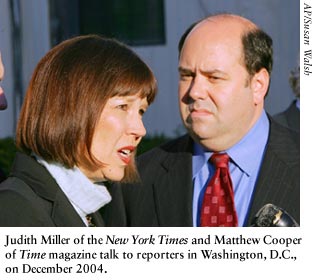New York, June 27, 2005—The U.S. Supreme Court has rejected an appeal filed by two journalists who refused to reveal their sources concerning the leak of a CIA officer’s identity. The journalists, Matthew Cooper of Time Magazine and Judith Miller of The New York Times, each face up to 18 months in jail for refusing to testify before a U.S. federal grand jury.
Cooper and Miller were held in contempt of court last year by a U.S. District Court judge in Washington, D.C. Chief Judge Thomas F. Hogan of the District Court stayed the sentences pending the appeal.
The attorneys general of 34 states filed petitions in favor of the journalists in the case, arguing that there is a vital public interest in allowing journalists to maintain the privilege of protecting the anonymity of their sources. The brief filed by the attorneys general noted that no fewer than 49 states, as well as other nations, have laws protecting journalists from revealing their sources.
“It’s extremely disappointing that the Supreme Court declined to hear this case, despite pleas by most of the nation’s state attorneys general and others that journalists’ ability to protect sources must be upheld,” said Ann Cooper, executive director of the Committee to Protect Journalists. “We are deeply disturbed that Miller and Cooper may soon be going to jail, and we are very concerned that today’s decision could have a ripple effect around the world, particularly in repressive countries where journalists are routinely compelled to reveal their sources.”
CPJ cited two troubling examples in the past year in which foreign governments have cited the U.S. contempt ruling to justify their own restrictive press laws.
- In a January 2005 letter to CPJ, the Cameroonian government justified the imprisonment of a journalist on defamation charges by saying: “You are aware that courts have decided in a number of countries that protection of free speech does not grant journalists, for instance, the privilege to refuse to divulge sources in all circumstances.”
- In Venezuela, government officials were quick to cite the U.S. contempt case in defending the December 2004 passage of a law restricting news coverage in the name of preserving social order.
CIA officer Valerie Plame’s identity was first revealed in July 2003 by syndicated columnist Robert Novak, who attributed the information to two unnamed “senior administration officials.”
A special prosecutor, Patrick Fitzgerald, was later appointed to determine whether any government officials committed a crime by willfully disclosing the identity of the undercover agent. Government prosecutors and the columnist have refused to say what information, if any, Novak provided to the grand jury. Novak was not publicly compelled to testify and he was not cited for contempt.
The contempt case now returns to U.S. District Court, where Time said it intends to ask Hogan to “reassess the privilege issues.” In a statement, Time noted that Fitzgerald may conclude that the disclosure of Plame’s identity did not violate the law. Thus, the magazine said, the investigation might not rise to the level that justifies the government compelling the identification of a reporter’s confidential sources.
Arthur Sulzberger Jr., chairman of The New York Times Co. and publisher of The New York Times, said: “It is shocking that for doing some routine newsgathering on an important public issue, keeping her word to her sources, and without our even publishing a story about the CIA agent, Judy finds herself facing a prison sentence.”
![]()
